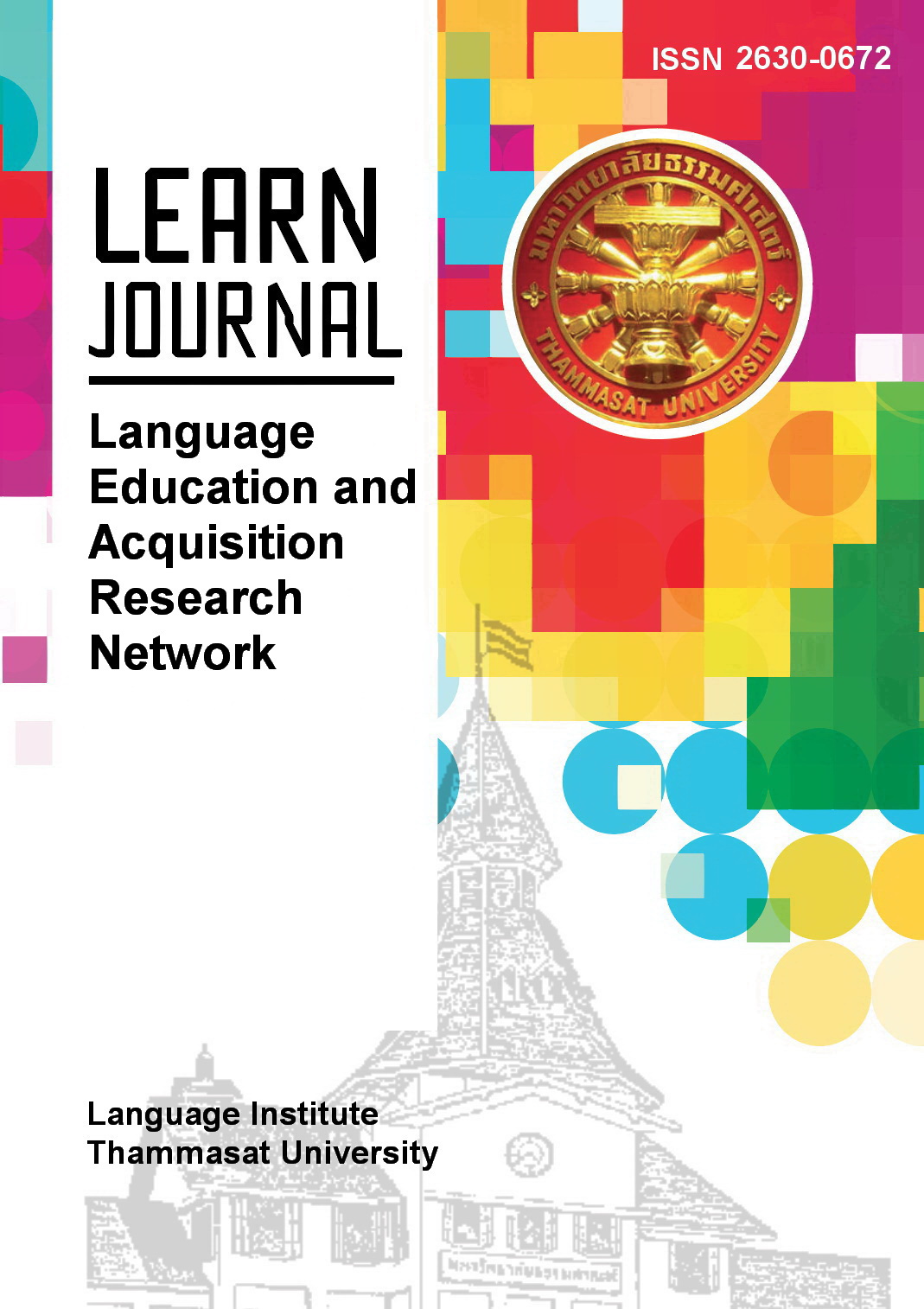Compression and Implicitness Through Dependent Phrases in Academic ESL Writing by Filipino Researchers Across Disciplines
Main Article Content
Abstract
Grammatical compression and implicitness have been proven as characteristics of academic writing (Biber & Gray, 2010, 2016), but they are an underexplored area of research particularly in academic ESL (English as a second language) writing. In this study, we explored the dependent phrases that most and least characterize academic ESL writing by cross-analyzing 42 published research articles (RAs) authored by Filipino researchers (FRs) in Curriculum and Instruction, Communication, and Psychology using Biber et al.’s (1999, 2021) framework. Salient findings showed that attributive adjectives, nominal prepositional phrases, and noun premodifiers had the highest frequencies of use, thus most characterizing academic ESL writing across disciplines. In contrast, prepositional phrases as adverbials and appositive noun phrases as noun postmodifiers had the lowest occurrences, hence least characterizing academic ESL writing. We argue that academic ESL writing regardless of its discipline is highly packed with dense information by the three most common nominal modifiers. Our study has applied implications for teaching academic writing, assessing academic writing, and publishing academic research.
Article Details
References
Ansarifar, A., Shahriari, H., & Pishghadam, R. (2018). Phrasal complexity in
academic writing: A comparison of abstracts written by graduate students and expert writers in applied linguistics. Journal of English for Academic Purposes, 31, 58-71. https://doi.org/10.1016/j.jeap.2017.12.008
Biber, D. (1988). Variation across speech and writing. Cambridge
University Press. https://doi.org/10.1017/CBO9780511621024
Biber, D. (2006). University language: A corpus-based study of spoken and
written registers. John Benjamins. https://doi.org/10.1075/scl.23
Biber, D., & Clark, V. (2002). Historical shifts in modification patterns with
complex noun phrase structures. In T. Fanego, J. Pe´rez-Guerra, & M. J. Lo´pez-Couso (Eds.), English historical syntax and morphology (pp. 43-66). John Benjamins. https://doi.org/10.1075/cilt.223
Biber, D., & Gray, B. (2010). Challenging stereotypes about academic
writing: Complexity, elaboration, explicitness. Journal of English for Academic Purposes, 9, 2-20. https://doi.org/10.1016/j.jeap.2010.01.001
Biber D., & Gray, B. (2011). Grammatical change in the noun phrase: The
influence of written language use. English Language and Linguistics, 15(2), 223–250. https://doi.10.1017/S1360674311000025
Biber, D., & Gray, B. (2016). Grammatical complexity in academic English:
Linguistic change in writing. Cambridge University Press. https://doi.org/10.1017/CBO9780511920776
Biber D., Gray, B., & Poonpoon, K. (2011). Should we use characteristics
of conversation to measure grammatical complexity in L2 writing development? TESOL Quarterly, 45(1), 5-35. https://doi.org/10.5054/tq.2011.244483
Biber D., Gray, B., & Staples, S. (2016). Contrasting the grammatical
complexities of conversation and academic writing: Implications for EAP writing development and teaching. LIF – Language in Focus Journal, 2(1), 1-18. https://doi: 10.1515/lifijsal-2016-0001
Biber, D., Johansson, S., Leech, G., Conrad, S., & Finegan, E. (1999).
Longman grammar of spoken and written English. Longman.
Biber, D., Johansson, S., Leech, G., Conrad, S., & Finegan, E. (2021).
Grammar of spoken and written English. John Benjamins. https://doi.org/10.1075/z.232
Brezina, V., Weill-Tessier, P., & McEnery, A. (2021). #LancsBox v. 5.x.
[software package]. http://corpora.lancs.ac.uk/lancsbox.
Commission on Higher Education. (2009). National higher education
research agenda 2 (2009-2018) (NHERA 2). Commission on Higher Education. https://ched.gov.ph/wp-content/uploads/2017/11/NHERA-2.pdf
Crystal, D. (2008). ‘Two thousand million?’. English Today, 24(1), 3–6.
Egbert, J., Larsson, T., & Biber, D. (2020). Doing corpus linguistics with a
corpus. Cambridge University Press. https://doi.org/10.1017/9781108888790
Fang, Z., Schleppegrell, M., & Cox, B. (2006). Understanding the language
demands of schooling: Nouns in academic registers. Journal of Literacy Research, 28(3), 247-273. https://doi.org/10.1207/s15548430jlr3803_1
Gray, B. (2015). Linguistic variation in research articles: When discipline
tells only part of the story. John Benjamins. https://doi.org/10.1075/scl.71
Halliday, M. A. K., & Martin, J. R. (1993/1996). Writing science: Literacy
and discursive power. Falmer Press. (Vol. first published in 1993, republished in 1996).
Hernandez, H. P. (2022). Prepositional phrases as noun postmodifiers in
disciplinary research articles authored by Filipino researchers: A cross-examination. International Journal of Language Studies, 16(1), 21-44.
Hughes, R. (1996). English in speech and writing: Investigating language
and literature. Routledge.
Hyland, K. (2008). As can be seen: Lexical bundles and disciplinary
variation. English for Specific Purposes, 27, 4-21. https://doi.org/10.1016/j.esp.2007.06.001
Jenkins, J. (2015). Global Englishes: A resource book for students (3rd
ed.). Routledge.
Li, L. J., & Ge, G. C. (2009). Genre analysis: Structural and linguistic
evolution of the English-medium medical research article (1985-2004). English for Specific Purposes, 28, 93-104. https://doi.org/10.1016/j.esp.2008.12.004
Mabayo, R. (2019, May 24). Considering history and narratives as Spain
and the Philippines approach 500th anniversary: At the 500th anniversary of the arrival of Spain in the Philippines, which narrative do we celebrate? The Diplomat. https://thediplomat.com/2019/05/considering-history-and-narratives-as-spain-and-the-philippines-approach-500th-anniversary/
Olson, D. R. (1977). From utterance to text: The bias of language in
speech and writing. Harvard Educational Review, 47, 257-281. https://doi.org/10.17763/haer.47.3.8840364413869005
Rosmawati (2019). Syntactic complexity in second language academic
writing in English: Diversity on display. In C. Wright, L. Harvey, & J. Simpson (Eds.), Voices and practices in applied linguistics: Diversifying a discipline (pp. 251–270). White Rose University Press. https://doi.org/10.22599/BAAL1.o
Ruan, Z. (2018). Structural compression in academic writing: An English-
Chinese comparison study of complex noun phrases in research article abstracts. Journal of English for Academic Purposes, 36, 37-47. https://doi.org/10.1016/j.jeap.2018.09.001
Senate of the Philippines. (2013, January 21). Senate declares Chinese
New Year as special working holiday [Press release]. https://web.archive.org/web/20210516035425/http://legacy.senate.gov.ph/press_release/2013/0121_prib1.asp
Swales, J. M. (2004). Research genres: Explorations and applications.
Cambridge University Press. https://doi.org/10.1017/CBO9781139524827
van Enk, A., & Power, K. (2017). What is a research article? Genre
variability and data selection in genre research. Journal of English for Academic Purposes, 29, 1-11. http://dx.doi.org/10.1016/j.jeap.2017.07.002
Wright, L. J. (2008). Writing science and objectification: Selecting,
organizing, and decontextualizing knowledge. Linguistics and Education, 19, 265-293.
Wu, Z., Mauranen, A., & Lei, L. (2020). Syntactic complexity in English as a
lingua franca academic writing. Journal of English for Academic Purposes, 43, 1-13. https://doi.org/10.1016/j.jeap.2019.100798
Yang, G. (2015). Grammatical features of structural elaboration and
compression common in advanced ESL academic writing [Master’s thesis, Brigham Young University].
Yin, S., Gao, Y., & Lu, X. (2021). Syntactic complexity of research article
part-genres: Differences between emerging and expert international publication writers. System, 97, 1-14. https://doi.org/10.1016/j.system.2020.102427


